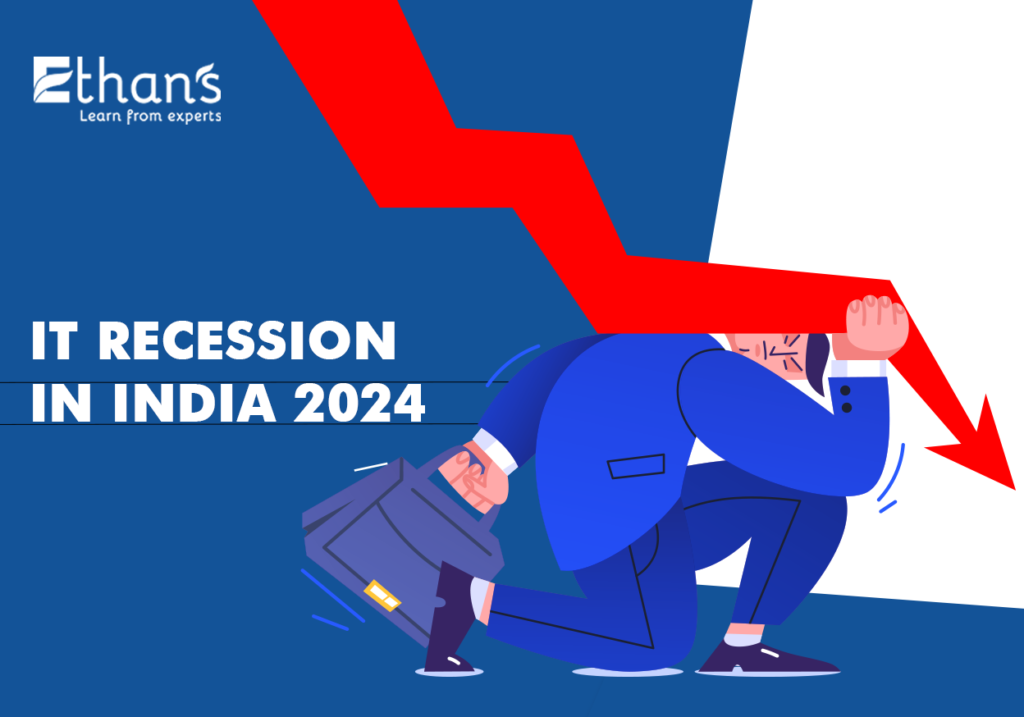In recent years, India’s Information Technology (IT) sector has been a powerhouse of economic growth and innovation, driving the country’s development and contributing significantly to its GDP. However, the year 2024 has brought unprecedented challenges to this once-booming industry, with the onset of an IT recession. This article explores the causes, consequences, and potential solutions to the IT recession in India.
The IT recession in India refers to a period of economic downturn specifically affecting the Information Technology sector. It is characterized by a slowdown in demand for IT products and services, leading to reduced revenue, job losses, and other adverse effects on the industry.
The term “recession” reflects the market’s transformative needs, not just economic downturns. It’s a call for industry-wide adaptation. Embracing change is vital to staying relevant. This shift demands proactive transformation from all industry stakeholders to thrive in evolving markets.
Factors Contributing to the IT Recession
Global Economic Slowdown
The global economy plays a significant role in shaping the fortunes of the IT industry. Factors such as trade tensions, geopolitical conflicts, and the COVID-19 pandemic have contributed to a general slowdown in economic activity worldwide. As a result, businesses have scaled back their IT investments, leading to reduced demand for IT services and solutions.
Technological Disruptions
The rapid pace of technological change has both fueled growth and posed challenges for the IT sector. Emerging technologies like artificial intelligence, blockchain, and the Internet of Things have transformed industries and business models, creating new opportunities while rendering some traditional IT services obsolete. Companies that fail to adapt to these changes risk falling behind and losing market share. Learn the most in-demand Data Analytics Skills from Industry experts at Data Science Course in Pune, Explore Now!
Policy Changes
Government policies and regulations can have a significant impact on the IT industry. Changes in taxation, immigration laws, and data protection regulations can affect the cost of doing business and the ease of access to talent and markets. Uncertainty about future policies can also dampen investor confidence and hinder long-term planning.
Impact on IT Professionals
The IT recession has had a profound impact on professionals working in the industry.
Job Losses and Salary Cuts
Many IT companies have been forced to downsize their workforce in response to declining demand and shrinking profit margins. This has led to widespread layoffs and furloughs, leaving many skilled professionals unemployed or underemployed. Those who remain employed have often had to accept salary cuts and reduced benefits as companies tighten their belts to survive the downturn.
Shift in Demand for Skills
The nature of work in the IT industry is constantly evolving, driven by changes in technology and business requirements. In times of recession, there is often a shift in demand for certain skills, with greater emphasis placed on cost-effective solutions, automation, and digital transformation. Professionals who possess in-demand skills such as cloud computing, cybersecurity, and data analytics are better positioned to weather the storm and remain competitive in the job market.
Effects on IT Companies
The IT recession has taken a toll on companies across the entire spectrum of the industry.
Decline in Revenue
Many IT companies have seen their revenue streams dry up as clients postpone or cancel projects in response to economic uncertainty. This has forced companies to lower their prices, offer discounts, and pursue new business opportunities to stay afloat. Some companies have been forced out of business altogether, unable to survive the prolonged downturn.
Consolidation And Restructuring
In an effort to survive the recession, many IT companies have resorted to consolidation and restructuring measures. Mergers, acquisitions, and strategic partnerships have become increasingly common as companies seek to reduce costs, gain market share, and diversify their offerings. This has led to a wave of layoffs, office closures, and other cost-cutting measures as companies streamline their operations and focus on core competencies.
Layoffs
Many tech companies are cutting jobs at a rate similar to 2020’s COVID-19 impact. It’s affecting big names like Meta Platforms and Amazon, along with smaller firms. This trend extends to Indian IT services and startups, signaling broader economic shifts. Stay ahead by mastering Data Analytics with experts at Pune’s Data Analytics Course!
Government Initiatives to Address the Recession
The Indian government has implemented several initiatives aimed at mitigating the impact of the IT recession and stimulating growth in the sector.
Skill Development Programs
To address the growing mismatch between industry demand and the skills of the workforce, the government has launched several skill development programs aimed at equipping IT professionals with the latest technologies and tools. These programs offer training and certification in areas such as cloud computing, cybersecurity, and digital marketing, helping professionals upskill and reskill to meet the changing needs of the industry.
Incentives for startups
Recognizing the importance of innovation and entrepreneurship in driving economic growth, the government has introduced various incentives and schemes to support startups in the IT sector. These include tax breaks, grants, and access to funding and mentorship programs designed to encourage innovation, create jobs, and spur investment in the sector.
Future Outlook for the IT industry
Despite the challenges posed by the IT recession, the future outlook for the industry remains cautiously optimistic.
Recovery Prospects
As the global economy gradually recovers from the effects of the pandemic and businesses resume their IT investments, the demand for IT products and services is expected to rebound. Additionally, the accelerating pace of digital transformation across industries is likely to create new opportunities for growth and innovation in the IT sector.
Adaptation to Changing Trends
To thrive in the post-recession era, IT companies will need to adapt to changing market trends and customer preferences. This may involve diversifying their service offerings, embracing emerging technologies, and adopting more agile and flexible business models. Companies that can anticipate and respond effectively to these changes will be well-positioned to succeed in the evolving IT landscape. For more information to check Ethans Tech about Job Oriented Courses with Placement Assistance.
One major reason for job cuts is the increasing demand for skilled candidates in fields like machine learning (ML) and artificial intelligence (AI). As companies prioritize innovation and digital transformation, they’re restructuring their workforce to accommodate these specialized roles. This shift reflects the evolving nature of industries, where proficiency in emerging technologies is crucial for staying competitive and driving growth.
Conclusion
The IT recession in India has presented significant challenges for the industry, impacting professionals, companies, and the economy as a whole. However, with strategic interventions from the government, proactive measures from industry players, and a spirit of innovation and resilience, the IT sector has the potential to emerge stronger and more resilient than ever before.



